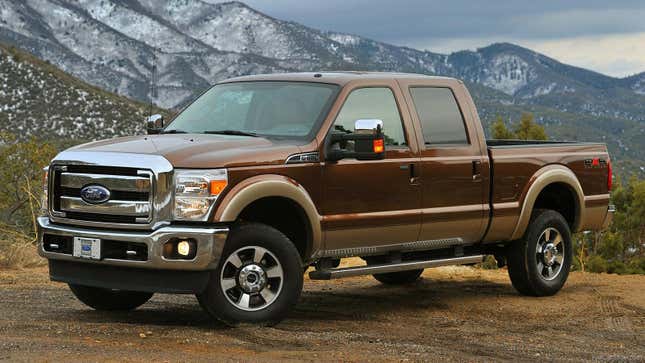
Automotive News reports that Ford has agreed to pay a $19.2 million settlement over allegations that the automaker misled consumers on two fronts: the fuel economy of the Ford C-Max, and the payload capacity of the Super Duty pickup truck.
The settlement, which involves 40 states and Washington D.C., stems from claims made in Ford’s advertising. Regarding the 2011 to 2014 Super Duty, the states allege that Ford used deceptive methodology to come up with its “best-in-class” payload rating. The accusation here is actually pretty wild: “Ford employed a truck configuration it did not actually intend to sell to individual buyers – one that omitted such standard items as the spare wheel, tire and jack, radio, and center console (which was replaced by a mini-console)” New Jersey Attorney General Matthew Platkin said in comments reported by Automotive News.
Why would Ford go to these lengths to do this? You have to think of the timing.

This was around the time when the Big Three’s pickup truck one-upmanship really kicked into high gear. In late 2010, Ford had just updated the 6.7-liter Powerstroke diesel with 800 lb-ft of torque. With that newfound power (and, it turns out, some deceptive testing procedures), Ford was able to claim a payload capacity of 7,070 pounds, best in class. But in 2011, GMC came along and snatched that crown with its Sierra 3500 HD and its 7,215-pound payload rating.

The problem with the C-Max comes down to an ad campaign from the time. Called “Hybrid Games,” the ads showed a C-Max Hybrid outperforming the Toyota Prius in terms of fuel economy. Ford claimed the C-Max delivered 47 mpg, city and highway, but in the real world, it averaged more like 42 mpg city, 37 highway. Because of this, Ford had to send out $550 checks to C-Max owners to make up for the difference in fuel costs.
Each state involved in the case against Ford will get a different portion of the $19.2 million settlement. Pennsylvania is getting $484,792 for instance, while Nebraska is getting $260,000.